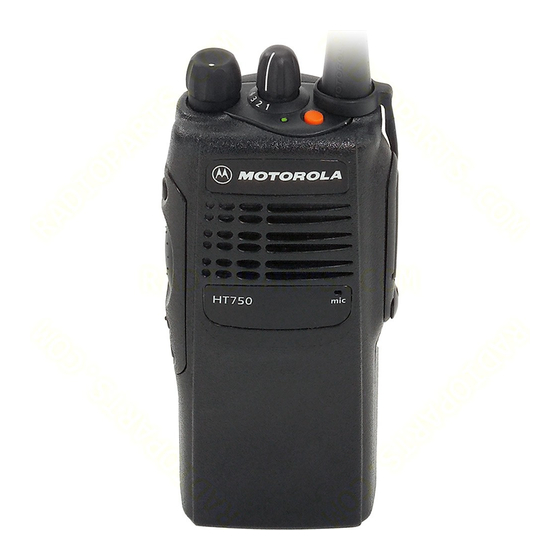Motorola HT750 - UHF/VHF/Low Band - Radio Kullanıcı Kılavuzu - Sayfa 26
Taşınabilir Radyo Motorola HT750 - UHF/VHF/Low Band - Radio için çevrimiçi göz atın veya pdf Kullanıcı Kılavuzu indirin. Motorola HT750 - UHF/VHF/Low Band - Radio 37 sayfaları. Two-way professional portable radio
Ayrıca Motorola HT750 - UHF/VHF/Low Band - Radio için: Broşür (30 sayfalar)

Safety and Warranty
OPERATIONAL CAUTIONS
Antennas
•
Do not use any portable two-way radio that
has a damaged antenna. If a damaged
antenna comes into contact with your skin,
a minor burn can result.
•
Make sure you have the correct antenna
installed for your radio's frequency band.
Ask your dealer for details.
Batteries
All batteries can cause property damage and/
or bodily injury such as burns if a conductive
material such as jewelry, keys, or beaded
chains touch exposed terminals. The
conductive material may complete an electrical
circuit (short circuit) and become quite hot.
Exercise care in handling any charged battery,
particularly when placing it inside a pocket,
purse, or other container with metal objects.
26
English
BATTERY INFORMATION
!
Charging Batteries
C a u t i o n
This product is powered by a nickel-cadmium (Ni-
Cd), nickel-metal-hydride (NiMH), or lithium-ion
rechargeable battery. Charge the battery before
use to ensure optimum capacity and
performance. The battery was designed
specifically to be used with a Motorola charger.
Charging in non-Motorola equipment may lead to
battery damage and void the battery warranty.
Note: When charging a battery attached to a
radio, turn the radio off to ensure a full
charge.
The battery should be at about 77°F (25°C)
(room temperature), whenever possible.
Charging a cold battery (below 50° F [10°C]) may
result in leakage of electrolyte and ultimately in
failure of the battery. Charging a hot battery
(above 95°F [35°C]) results in reduced discharge
capacity, affecting the performance of the radio.
Motorola rapid-rate battery chargers contain a
temperature-sensing circuit to ensure that
batteries are charged within the temperature
limits stated above.
